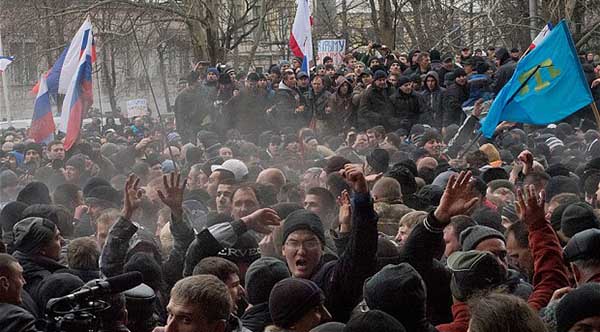ATHENS, Greece - The European Union will continue to work with Russia and Ukraine to reduce tensions between the two countries but will keep sanctions as an option, the EU foreign policy chief said Saturday.
Catherine Ashton said "work is ongoing" to ensure the 28-nation bloc is prepared to take measures against Russia if that becomes necessary, and stressed the "need to persuade Russia to de-escalate the situation."
Russia annexed the Crimean Peninsula in March following a referendum called just two weeks after Russian forces had overtaken the Ukrainian region. Ukraine and the West have rejected the vote and the annexation.
The Ukraine crisis dominated the two-day informal talks in Athens among EU foreign ministers. Speaking just before the meeting got under way Friday, British Foreign Secretary William Hague urged EU partners to develop possible stricter sanctions against Russia should they become necessary. The EU has imposed sanctions against individuals.
The EU will continue to consult with Moscow and Washington on planned economic agreements with Ukraine and Moldova, Ashton added.
"The agreement with Ukraine would have a positive impact on the Russian economy. We will continue to engage Russia," and the U.S., she said.
Despite talks of a unified EU front towards Russia on Ukraine, there were different emphases in approach, from the harder stance of countries such as the U.K. and Sweden, to countries such as Greece, which believe sanctions can't be used in isolation to solve the Russia-Ukraine crisis.
Greek Foreign Minister Evangelos Venizelos, who was hosting the meeting, stressed that "sanctions are not an end in themselves ... the issue is de-escalation that will lead to a definitive and working solution."
Swedish foreign minister Carl Bildt stressed the need for resolve on the issue of respecting international law.
"I think it is very clear that Russia has changed in the past two years," he said. "They intend to be an Orthodox bastion against the West. They (engage in) very aggressive propaganda, sort of the muscular East versus the decadent West."
Referring to a public rally last month in which Russian president Vladimir Putin spoke in front of a banner reading "Crimea is in my heart" Bildt said, "We have to wonder, what else is in his heart?"
Besides Ukraine, the foreign ministers also discussed Syria's civil war, Saturday's elections in Afghanistan and the situation in North Africa, including Tunisia, Egypt and Libya.(AP)

